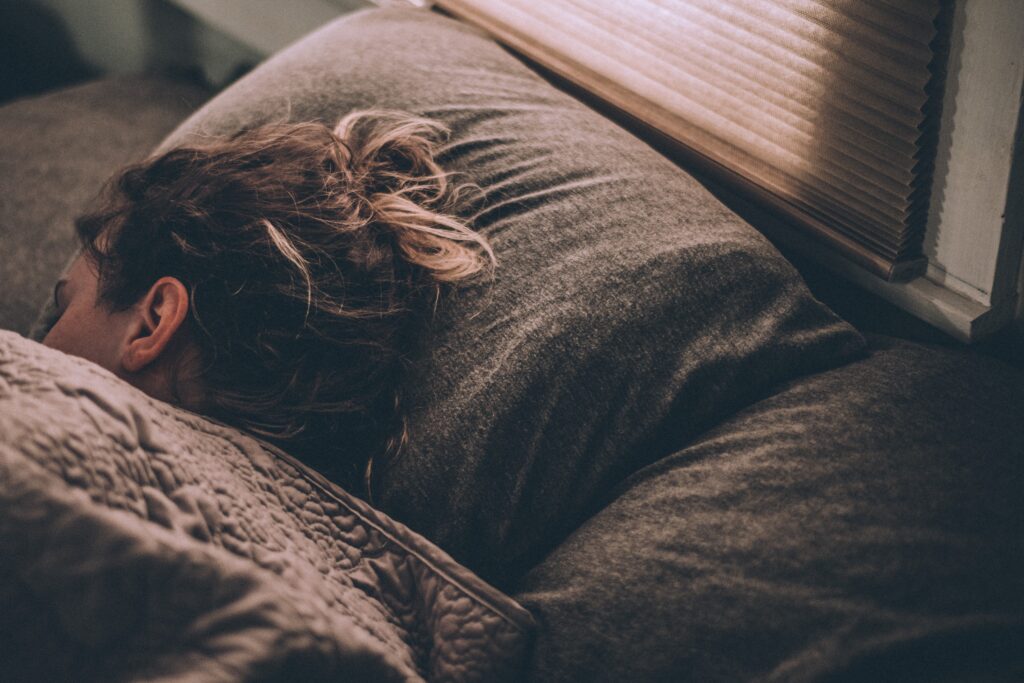It’s a vicious cycle: you feel anxious, so you can’t sleep. But then the lack of sleep increases your anxiety symptoms because your body isn’t getting adequate rest.
The pattern continues.
You may find yourself wondering if your problem is insomnia or anxiety, or both. Either way, you’re tired (literally and figuratively) of being awake at night.
Here’s are some clues into what might be going on, causing you so many sleepless nights.
Is It Anxiety?
Anxiety itself, of course, can cause distressing physiological symptoms that make sleep seemingly impossible. Anxious people feel on edge, unable to relax, full of fearful thoughts and worries. Racing hearts, nervous sweats, and gastrointestinal issues might also be present.
It’s no wonder that sleeping is difficult with these types of symptoms. The intrusive nature of worrisome thoughts makes it hard for the brain to achieve a regular sleep pattern. Your mind and body can’t calm down enough for you to enter dreamland.
Unfortunately, as this continues, you begin to worry about bedtime itself. Your negative anticipation plays on your anxiety and makes it even harder to get to sleep.
Is It a Sleep Issue?
On the flip side, sleep deprivation itself can set off anxiety symptoms. Researchers believe that the lack of sleep increases activity in the part of the brain that regulates worry and fear.
You may be able to keep on top of life’s demands well when rested, but lose this balance when you don’t get enough sleep.
When we feel tired, we have a harder time regulating our emotions, maintaining positive thoughts, and managing our response to stress. We become more susceptible to giving into sugar and caffeine temptations. Both of these substances can further exacerbate anxiety as well as cause energy crashes that increase our fatigue.
We may feel so tired that we can’t muster the energy to exercise as well. Exercise is wonderfully beneficial to both anxiety symptoms as well as sleep problems. Just as with sugar and caffeine, our tiredness leads to poor decisions that hurt, rather than help, our sleeplessness.
Natural Ways to Regulate Anxiety and Promote Sleep
The most important thing to remember is to find ways to establish healthy sleep patterns. You can implement many things at home, of course. But you may also find that you need the assistance of a professional.
Tried and true ways to improve your sleep and help alleviate anxiety include the following:
- Exercise. Even a ten-minute walk can be helpful.
- Cut out caffeine. This is a challenge for many people, but try to cut back and/or limit intake to the morning hours. The stimulant effects of caffeine interfere with sleep and contribute to the physical symptoms of anxiety.
- Meditate. It doesn’t have to be complicated. Five minutes sitting somewhere comfortable with your eyes closed and listening to ambient noise is an excellent place to start.
- Cut off screen time early. Blue light interrupts the brain’s sleep processing. News, social media, and other distractions are also not helpful close to bedtime.
- Control your bedroom environment. Cooler temperatures and as dark an environment as possible are shown to aid sleep. Light blocking curtains can do wonders. Cotton bedding is also better for temperature control than synthetics. Reserve the bedroom for rest; don’t use it for television or screen time.
- Take magnesium glycinate (not magnesium citrate) in the evenings can also be helpful for many.
If your anxiety and sleep issues continue, seeking help is vital. Your quality of life will improve significantly by addressing your body’s need for adequate rest.
When your brain and body get the replenishment they need, you are better equipped to handle stress, challenge your negative thoughts, and live successfully.
—
A therapist can help you evaluate the sources of your insomnia, and, if necessary, refer you to other medical professionals for more evaluation. If you are caught in the cycle of anxiety and sleeplessness, please reach out to us for help new-perspective-counseling.com/contact
New Perspective Counseling is a group practice dedicated to emotional wellness and healing. Our caring therapists provide psychotherapy, individual counseling, marriage counseling, and family counseling in our Highland, Michigan office. We are located conveniently near Milford, White Lake, Commerce Township, Holly, Hartland, and Brighton, Michigan.


